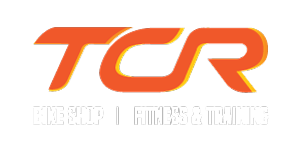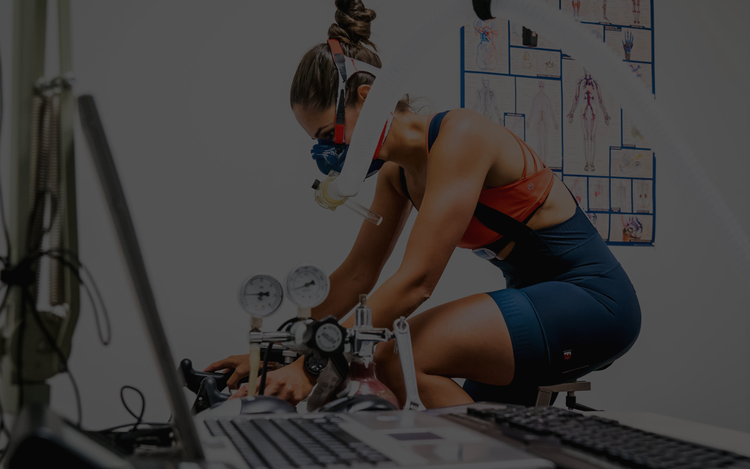Our assessments give you precise, actionable insights into your health and fitness. We measure everything from VO2 max to body composition, creating a custom roadmap to maximize your training with clarity and purpose.
The Gold Standard Test of your aerobic fitness and respiratory health. VO2max is highly correlated to your longevity.
VO2 testing will provide you with a big picture view of your current fitness and potential.
You will receive:
- VO2max score (Treadmill or Bike)
- Heart Rate Zones for training
- Zones 1-6 for Cycling or Running
- Fat Burning efficiency
- Ventilation (lung) efficiency
- Caloric Burn Rate (Glycogen Calculator)
- Recommendations for future training
Allow 90 mins
Our VO2 test followed up with a Blood Lactate test over two days. More information is power. We use the VO2 test to determine your current fitness and respiratory health and then use Lactate testing to verify your training zones.
Day One:
- VO2max (Treadmill or Bike)
Day Two:
- Blood Lactate Test (2-7 days after the VO2 test)
Allow 60-75 min for Day One and Two
Lactate analysis provides an objective, scientific method to establish your precise training zones. It eliminates the guesswork, tailoring your regimen to your unique physiology—from amateurs to professional athletes.
You will receive
- Lactate Threshold 1 (LT1)
- Lactate Threshold 2 (LT2)
- Zones 1-5
- Lactate Curve plotting your response to the workloads or speeds.
- Bike or Run
Allow 75-90 min
A Resting Metabolic Rate analysis measures how many calories your body burns at rest, giving you a clear picture of your baseline energy needs. Using accurate metabolic testing, we eliminate guesswork and create personalized nutrition and training strategies based on how your body actually functions.
Allow 45 mins
We use the BodyMetrix™ System of ultrasound technology. This high tech, cutting edge device allows us to quickly, easily and accurately make assessments without using skinfold calipers. No more pinching!
Assessments are not affected by hydration, exercise level or caffeine intake. Body composition is calculated by measuring subcutaneous fat thickness at multiple sites.
- Percent body fat
- Individual site fat thickness
- Cross-sectional scans to directly see fat and muscle layers
Single testing and 3-pack bundles available.
We conduct cardiopulmonary exercise testing (CPET) for individuals that have a potential Myalgic Encephalomyelitis/Chronic Fatigue Syndrome (ME/CFS) diagnosis. The two-day Steven’s Protocol is used whereby the patient performs two progressive VO2 tests over two days separated by 24 hrs.
We measure energy production, ventilation, heart rate, substrate utilization and lactate accumulation. The CPET has been shown to be a robust post-exertional symptom flare (termed, post-exertional malaise); a cardinal symptom of the disease.
Patients are often referred by Dr. Eleanor Stein who specializes in ME/CFS and environmental sensitives. TCR is one of the team members of Dr. Stein’s group.For more information, please contact Exercise Physiologist Cory Fagan
—
A detailed 15 page report is compiled a few days after your CPET assessments. Copies are sent to you and your physician for review.
A hemoglobin test is a blood test often used to check for anemia, a condition in which your body does not make enough healthy red blood cells. If you have anemia, the cells in your body don't get all the oxygen they need.
We can check your hemoglobin levels which will determine the effect of your training and diet on your oxygen carry ability. A low hemoglobin score is associated with fatigue and over-training.
One of the easiest ways of running faster or increasing your run enjoyment is through proper running technique. If you are frequently getting injured, a gait analysis or running evaluation will eliminate many of the mistakes you could be making. Perhaps you want to attempt a new distance such as a marathon or ultra-marathon! Running efficiently is essential to going long with confidence and enjoyment. The gait analysis will evaluate shoe choice, stride technique, body position, stride rate and overall training. We approach running from a “Posture first” philosophy as correct posture allows proper technique to develop.
This two-part evaluation will compare your running style to researched methods of efficient distance running. Two 45 minute sessions will focus on developing the stronger points of your running ability as well work on minimizing aspects of your stride that may cause injury or inefficiency.
Enjoy a complimentary Altitude Class to test your new running skills!
Insurable Billable Run Analysis through National Spine and Wellness (NSW).
Duration: 2 x 45min @ TCR and 45 min @ NSW
Learn to run with improved technique and efficiency. We will perform video analyses and coach you to run with improved technique and efficiency. NSW will assess your overall musculoskeletal health and work with TCR to help your running technique.
3 visits are required in this order.
- Run Analysis at TCR
- Chiropractic analysis at NSW
- Final Run Analysis at TCR
Insurance coverage varies by provider. Typically, you can expect $75-150 reimbursement for the claim. NSW will coordinate the billing.
What Test Should I Do?
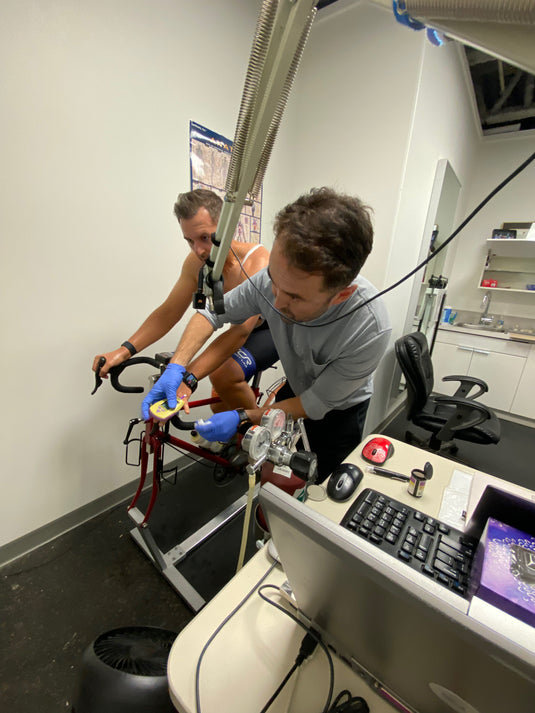
Blood Lactate or VO2max

Resting Metabolic Rate and Body Composition

VO2 max test
Testing Packages
VO2 Test
Run Analysis
Body Composition
Regular $417
3x Body Composition
Regular $149
Body Composition
Resting Metabolic Rate
Regular $198
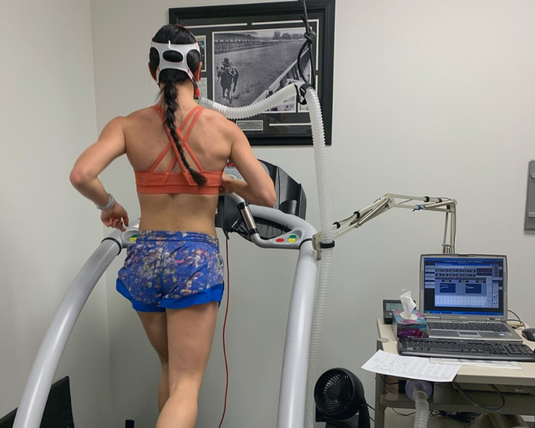
V02 TESTING
I’ve been here for both V02 max testing and bike sizing and had great experiences each time. Cory (owner/op) is easy to talk to, friendly and will get you on the right track to meet your goals. I would highly recommend this shop.
ERIC PAXMAN, LOCAL GUIDE
UNLOCK YOUR POTENTIAL WITH OUR CUTTING-EDGE PHYSIOLOGY ASSESSMENTS AT TCR SPORT LAB
Our physiology assessments serve as your roadmap, offering an in-depth analysis of your body's capabilities and potential. Train more effectively, recover smarter, and compete stronger.
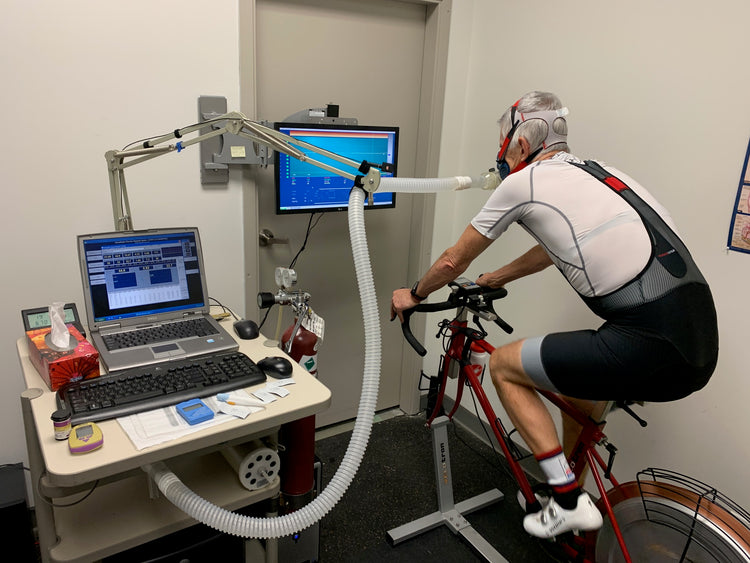
FREQUENTLY ASKED QUESTIONS
For VO2, Lactate, CPET, and Running Analysis: Please bring your cycling or running gear as appropriate, which includes shorts, shoes, and a shirt. We'll provide the pedals for the bike tests. Don't worry if you don't own cycling shoes – we've got you covered with our flat pedals.
For Body Composition tests: To ensure accurate measurements, please wear shorts and a T-shirt.
For Resting Metabolic Rate evaluations: We recommend wearing comfortable clothing to help you relax during the test. Comfort is key for an accurate reading.
For VO2, Lactate, CPET, and Running Analysis: We recommend you arrive well-rested and prepared for physical activity. To ensure accurate results, please avoid strenuous workouts the day preceding the assessment.
For Body Composition tests: It's best to refrain from exercise for at least 6 hours prior to your appointment. This ensures your body is in a relaxed state, contributing to the accuracy of the results.
For Resting Metabolic Rate (RMR) evaluations: Please avoid consuming any food for 12 hours before your test, although water intake is perfectly fine. Additionally, try to skip any form of exercise on the morning of the RMR test. These measures help us gain an accurate assessment of your basal metabolic state.
The insights gained from a physiology assessment can help tailor your training regimen to your body's specific needs, enhancing your performance and reducing the risk of injury.
It can help identify your strengths and areas for improvement, enabling you to focus your training efforts more effectively.
The frequency of assessments depends on your personal goals, your current fitness level, and any changes in your training regimen. However, it's generally recommended to have an assessment every 3-6 months to effectively track your progress and adjust your training plan accordingly.
